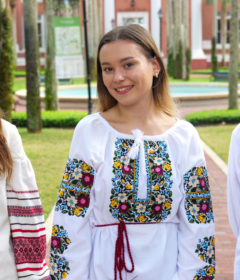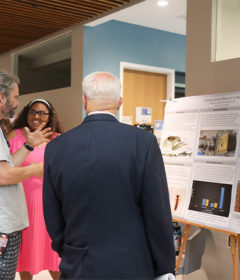Stetson to Launch New Minor in Sustainable Food Systems
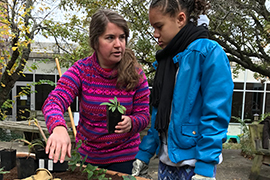
The way Sarah Cramer sees it, everybody eats three times a day and makes choices that impact the globe.
“You get to make a decision about what kind of world you want to live in through the food that you grow and the food that you buy, so I feel like that is a place where people actually can make a change,” she said.

Cramer will earn her Ph.D. this spring in Agricultural Education from the University of Missouri and then join Stetson’s Department of Environmental Science and Studies as a Brown Visiting Teacher-Scholar. She and the department are supporting the launch of a new interdisciplinary program that will offer a Minor in Sustainable Food Systems.
For the fall 2018 semester, Cramer will teach Introduction to Food Studies and a proposed Junior Seminar called Seeds of Equity, which will examine food production, access and distribution through a lens of race, class and gender, showing the inequities that permeate America’s food system — from food insecurity to migrant labor. She currently teaches the Seeds of Equity class at the University of Missouri as a graduate assistant.
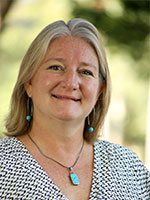
Stetson’s new Sustainable Food Systems minor eventually may be expanded into a major, said Wendy Anderson, Ph.D., professor and chair of the Department of Environmental Science and Studies.
“We wanted to launch with a minor to see the level of interest among students,” Anderson said. “If it seems that there’s a really strong interest, then we can easily justify expanding out to a major within a year or two.”
The new minor was approved this month by Provost Noel Painter, Ph.D., and awaits approval from the accrediting body, the Southern Association of Colleges and Schools, Anderson said. That approval is expected, so the new program will be added to the course catalog for the fall. The new minor can be paired with any undergraduate degree, and requires five courses and 20 credit hours.
Sustainable Food Systems is an emerging field of study and popular with college students today, with a growing number of universities from Temple to the University of Michigan adding programs. Stetson’s program will be interdisciplinary, with courses taught by professors of public health, chemistry and other environmental sciences, as well as media and communication.
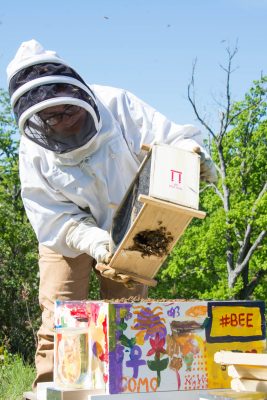
“I think the combination of the food systems minor with just about any major is a recipe for success for people who are interested in food,” Anderson said. “Food is the second largest sector in the global economy after energy. … Food is everything. There are so many jobs in food, whether that’s production and all the innovation going into production, or food delivery, food service, everything about food.”
Cramer will serve as a visiting Brown Teacher-Scholar for two years and will bring experience as an educator with a non-profit school garden, including one year as an AmeriCorps member. Research has shown that school gardens help students learn about everything from math and science to healthy eating.
“Many subjects that students are supposed to be learning under state core curriculum standards, they can learn in the garden,” explained Anderson. “We know gardens have a positive effect on kids. Sarah has refined assessment tools to actually document that and also to document the impact on teachers who use gardens for their classes.
“When teachers see that they have better learning and teachers see behavioral changes are improved when students get time out in the garden, it really changes their attitude about garden education as a pedagogical strategy,” Anderson said.
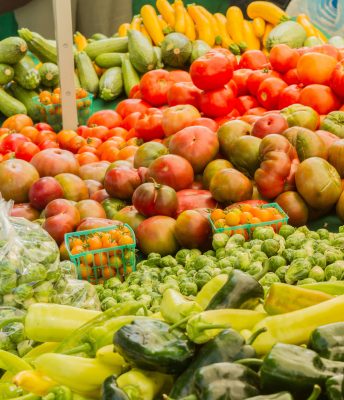 Cramer’s teaching will tie in with Stetson’s Department of Education and help train education majors in the benefits of school gardens. And she will work with Stetson’s Hatter Harvest, which maintains an organic vegetable garden on campus, and promotes healthy eating and sustainable practices in agriculture, such as composting and water conservation.
Cramer’s teaching will tie in with Stetson’s Department of Education and help train education majors in the benefits of school gardens. And she will work with Stetson’s Hatter Harvest, which maintains an organic vegetable garden on campus, and promotes healthy eating and sustainable practices in agriculture, such as composting and water conservation.
“School gardens are becoming increasingly popular in schools around Florida and are a great tool to teach various academic subjects, as well as a love for the environment,” added Education Professor Mercedes Tichenor, Ed.D. “I’m excited about working with Sarah and using her expertise to increase our students’ garden-based learning opportunities.”
An avid beekeeper, Cramer said she loved the Stetson campus when she interviewed in January and looks forward to moving from her home state of Missouri to the sunny South. She has a master’s degree in Public Health from the University of Missouri and a bachelor’s degree in Biology from Truman State University in Missouri.
“I got to see the hives on campus when I visited Stetson, and I’m really excited about that,” she said. “I’m excited to keep bees in a place where winter is not so harsh because our problem here in Missouri is that it gets so cold that bees starve over the winter, but in Florida it seems like there’s always something blooming, so that will be a fun learning curve for me.”
-Cory Lancaster

